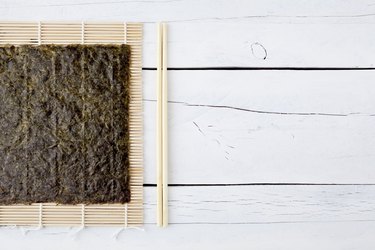
A type of dried seaweed that is commonly used in Japanese and Korean cuisine, nori is typically available in thin sheets that are cut or torn into smaller pieces. The smaller pieces are then used to wrap around a bite-sized portion of rice, as a garnish or in a variety of sushi dishes.
Nori is generally regarded as safe to eat in moderate amounts and provides an abundance of healthful properties. However, excessive consumption of nori may have hazardous side effects. If you experience medical complications or take prescription medications, consult with your medical provider regarding your dietary needs.
Video of the Day
Video of the Day
Read more: Things to Consider When Snacking on Dried Seaweed
High Sodium Content
According to the MedlinePlus, sodium is need by the body for proper functioning of nerves and muscles and to maintain a healthy blood pressure. The 2015-2020 Dietary Guidelines for Americans recommends 2,300 milligrams of sodium each day; however, average American adults consume 3,400 milligrams of sodium daily, putting them at risk for health complications.
One full sheet of roasted nori contains 3 milligrams of sodium. While this amount may appear insignificant, some flavored nori sheets contain additional sodium. When dining out in a Japanese restaurant, consumption of sodium may accumulate very quickly among the nori, soy sauce and added salt for flavoring. Individuals on a low-sodium diet should restrict their sodium intake, as excess sodium may lead to health complications such as congestive heart failure, cirrhosis and chronic kidney disease.
Source of DHA
DHA, or docosahexaenoic acid, is a type of omega-3 fatty acid. While is it commonly found in seafood products, such as salmon, mackerel, tuna and sardines, seaweed is a vegetarian source of DHA. The Office of Dietary Supplements notes that omega-3 fatty acids like DHA promotes proper development of the nervous system and supports brain and vision health. However, ODS also reports that DHA may also interact with certain blood pressure medications. DHA may reduce blood pressure, thereby enhancing the effects of prescription blood pressure medications.
Read more: 6 Benefits of Kelp That Will Keep Your Body Healthy
Rich in Vitamin K
According to USDA FoodData Central, seaweed is a source rich in vitamin K. The Linus Pauling Institute states that vitamin K serves as an anticoagulant and protects against arterial blood clotting, thereby allowing blood to flow freely to the heart, lung and brain.
However, excessive amounts of vitamin K may interact with blood thinning medications, such as warfarin. Vitamin K may make warfarin a less effective drug and may increase the risk of blood clots and stroke. If you're taking warfarin, or another blood thinner, talk to your doctor about nori and how it can fit into your diet plan.
Additional Health Concerns
According to a May 2019 review published in Nutrition Reviews, seaweed is a source of heavy metals, such as arsenic. While the amounts in a single sheet of nori may be low, there is the possibility of bioaccumulation over time. The authors of the study also note there is a potential risk of foodborne illness with regular use of edible seaweed.
- Linus Pauling Institute: "Vitamin K"
- 2015-2020 Dietary Guidelines for Americans: "Key Recommendations"
- FDA: "Use the Nutrition Facts Label to Reduce Your Intake of Sodium in Your Diet"
- FoodData Central: "Toasted Sushi Nori"
- Office of Dietary Supplements: "Omega-3 Fatty Acids"
- Nutrition Reviews: "Risk and Benefits of Consuming Edible Seaweed"
- MedlinePlus: "Sodium"